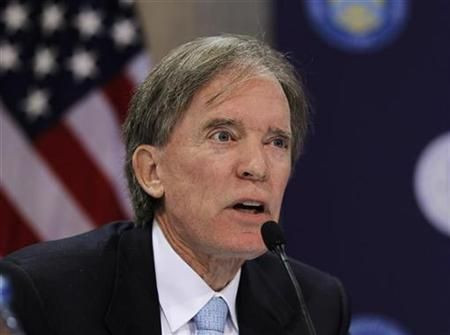PIMCO's Bill Gross Admits Error on U.S. Treasury Securities

Bill Gross, manager of the world's largest bond fund, apologized to his investors late Friday for his poor performance, saying, I'm just having a bad year.
In a special-edition letter posted on PIMCO's Web site, Gross, who runs the $242 billion PIMCO Total Return portfolio, wrote that he underestimated the contagion effect from the Europe debt crisis and the U.S. debt-ceiling debacle.
As Europe's crisis and the U.S. debt-ceiling debacle turned developed economies toward a potential recession, the Total Return Fund had too little risk off and too much risk on, said Gross, who also shares the title of co-chief investment officer at Pacific Investment Management Co. with Mohamed El-Erian.
Gross, known as the Bond King, came under heavy criticism this year when he bet heavily against U.S. Treasury securities, which have turned out to be one of the biggest outperformers of 2011.
His fund's poor performance led Gross to simply call his open letter to investors, Mea Culpa.
It is up only 1.06 percent year to date, while its benchmark BarCap U.S. Aggregate Index is up 3.99 percent.
Gross, who helps manage more than $1.2 trillion at PIMCO, said late Friday the Total Return fund had positions in German bonds and Canadian Treasuries to counter the U.S. underweight position, but not enough.
He added that minor percentages of emerging-market corporate and sovereign debt, effectively denominated in their local nondollar currencies, did not perform well either.
The simple fact is that the portfolio at midyear was positioned for what we call a New Normal developed world economy -- 2.0 percent real growth and 2 percent inflation, Gross said.
That's all changed, of course. Gross said PIMCO's internal growth forecast for developed economies is now zero percent over the coming several quarters, and the portfolio more accurately reflects this posture.
Last week, Reuters reported that Gross ramped up buying of mortgage-backed securities (MBS) last month, albeit by using leverage, on the likelihood the Federal Reserve's reinvestment program in those securities will boost prices significantly.
Gross increased mortgage debt to 38 percent of assets in September, from 32 percent in August, as the U.S. central bank announced last month that it will now reinvest principal payments from its holdings of agency debt and agency mortgage-backed securities in agency mortgage-backed securities.
His move into MBS also comes as the PIMCO Total Return fund's cash equivalents and money-market securities fell to negative 19 percent September, from negative 9.0 percent in August.
In having a so-called negative position in cash equivalents and money-market securities, it is an indication of using derivatives and short-term securities as collateral to boost the fund's buying power with leverage.
Gross' move to seek more yield by putting more money into mortgage bonds is yet another bold bet that many will be watching after Gross' call on U.S. Treasury securities cost his fund's performance. In doing so, he is effectively extending the average duration of his fund's investments, making them potentially more exposed to rising interest rates.
Clearly, Gross is betting interest rates will remain low for some time as the world economy continues to struggle.
In his Mea Culpa letter, Gross resorted to baseball analogies and metaphors. He closed his letter by saying: This is big league ball, where your ticket holders come to the park expecting not a circus-Willie Mays-catch but more wins than losses and a year-end performance that places your bond assets near the top of the standings.
He added, Baseball metaphors aside, we know why PIMCO Total Return is arguably the largest and hopefully the greatest bond fund in the world.
Reuters
© Copyright Thomson Reuters {{Year}}. All rights reserved.





















